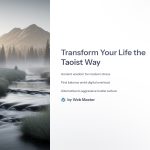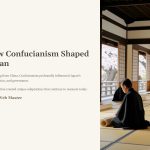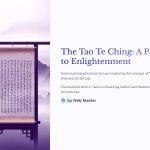 Living in a world that never stops moving, people are increasingly seeking ways to reconnect with simplicity, balance, and meaning. One ancient yet profoundly relevant philosophy offers just that—Taoism. As we navigate modern stress, consumerism, and digital overload, adopting Taoist principles can lead to more mindful living, deeper connections, and an overall sense of peace. From letting go of rigid control to aligning with nature’s rhythm, Taoist living presents a radical yet gentle alternative to the aggressive hustle culture. With growing interest in minimalism, meditation, and holistic health, the Taoist way of life is not only timeless but timely. This post explores how Taoist philosophy, known for its emphasis on flow, harmony, and inner wisdom, can help reshape the way we live, work, and relate to ourselves and the world.
Living in a world that never stops moving, people are increasingly seeking ways to reconnect with simplicity, balance, and meaning. One ancient yet profoundly relevant philosophy offers just that—Taoism. As we navigate modern stress, consumerism, and digital overload, adopting Taoist principles can lead to more mindful living, deeper connections, and an overall sense of peace. From letting go of rigid control to aligning with nature’s rhythm, Taoist living presents a radical yet gentle alternative to the aggressive hustle culture. With growing interest in minimalism, meditation, and holistic health, the Taoist way of life is not only timeless but timely. This post explores how Taoist philosophy, known for its emphasis on flow, harmony, and inner wisdom, can help reshape the way we live, work, and relate to ourselves and the world.

What Is the Taoist Way of Life?
The Taoist lifestyle is rooted in the ancient Chinese philosophy of Daoism, centered around the concept of the “Tao” (or “Dao”), meaning “The Way.” It is not a religion in the traditional sense but a spiritual and philosophical approach to life. At its core, Taoism teaches that everything in life flows according to a natural order, and true fulfillment comes not from resistance but from alignment with this flow. The Tao is not something that can be seen or named—it is the underlying principle of the universe, present in nature, the cosmos, and ourselves. To live according to the Tao is to live with authenticity, effortlessness, and balance.
Practically speaking, Taoist life is about simplicity, non-attachment, and embracing spontaneity. Unlike Western paradigms that value productivity, competition, and planning, Taoism encourages a life of presence and quiet awareness. This approach is increasingly appealing to modern individuals overwhelmed by schedules and constant pressure. Whether through gentle movement practices like Tai Chi, or meditative walks in nature, Taoist living invites us to slow down and tune in.

Wu Wei: The Art of Effortless Action
“Wu Wei” is a cornerstone of Taoist practice. Often misunderstood, it does not mean doing nothing, but rather doing nothing unnatural or forced. It’s the art of action without effort, like water flowing around rocks—graceful, intuitive, and effective. Wu Wei teaches us to respond to life rather than resist or over-control it. In modern terms, it can be thought of as “flow state”—when you are fully immersed in a task, not because of pressure, but because it feels natural.
Embracing Wu Wei in daily life can lead to less stress and more joy. It allows decisions to unfold with clarity, creativity to thrive without ego, and relationships to deepen through authenticity. Rather than pushing against time or people, Wu Wei guides us to act in harmony with circumstances. Even in business or parenting, this mindset fosters trust and efficiency.

Living in Harmony with Nature
Taoism sees nature as the ultimate teacher. The cycles of the seasons, the flow of rivers, and the stillness of mountains all offer profound lessons in patience, flexibility, and strength. A Taoist way of life emphasizes attuning to these rhythms—eating seasonally, rising and resting with the sun, and respecting the natural order of things.
This philosophy can be integrated into modern life through sustainable living practices, mindful consumption, and ecological awareness. Urban dwellers can apply Taoist principles by creating green spaces at home, walking barefoot on the earth, or simply observing the sky. In doing so, we reclaim a sense of connection often lost in artificial environments. Nature reminds us that growth is not constant and that stillness has its own power.

Simplicity and Minimalism in Daily Living
At its heart, Taoism promotes simplicity—not as deprivation, but as clarity. This aligns closely with the global minimalism movement, which encourages intentional living by removing excess. In Taoist practice, simplicity is a path to freedom. It helps reduce distraction, anxiety, and the constant need to acquire or prove something.
Modern Taoist-inspired minimalism isn’t about white walls or sparse rooms—it’s about living with what truly serves your well-being. This could mean clearing your calendar of non-essential commitments or choosing quality over quantity in purchases. It’s a gentle rebellion against the overstimulation and materialism of our era, and a return to what matters most.

Cultivating Inner Stillness and Self-Knowledge
Taoism invites us to listen inwardly. The path of self-knowledge in this tradition is not one of aggressive self-improvement, but of quiet observation and acceptance. Through practices like meditation, breathwork, and silent contemplation, Taoists learn to dwell in their natural state of being without the need for external validation.
This cultivation of inner stillness strengthens intuition, reduces anxiety, and allows for more authentic action. It’s not about achieving more but understanding what already is. Especially in a digital age where our attention is constantly pulled outward, this internal practice becomes a sanctuary for clarity and personal truth.

Taoism as a Modern Philosophy for Meaningful Living
Taoism doesn’t require us to become monks or abandon society. Instead, it offers a lens through which we can view our lives more gracefully. Whether you’re a student, entrepreneur, parent, or retiree, these principles can be woven into any context. The beauty of Taoism lies in its flexibility and gentleness—it meets you where you are and invites you to flow with life rather than against it.
As mental health concerns rise and people seek deeper meaning beyond achievement, Taoist philosophy provides tools for resilience, empathy, and joy. It is a way to reclaim your energy, realign your priorities, and reawaken your sense of wonder. It doesn’t promise perfection—it celebrates presence.
*Capturing unauthorized images is prohibited*




